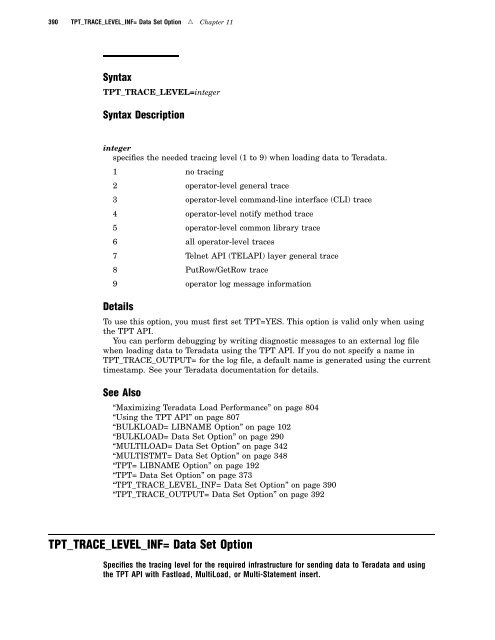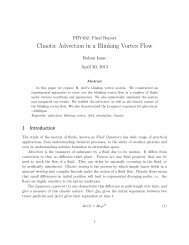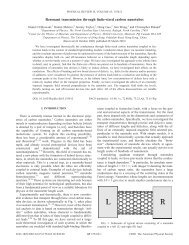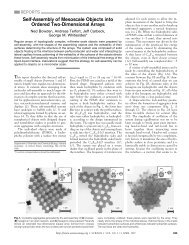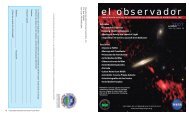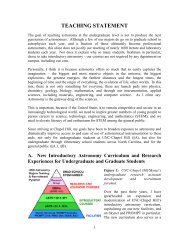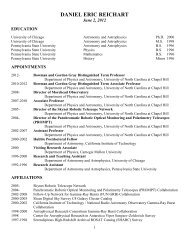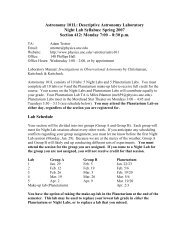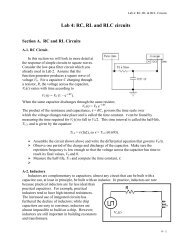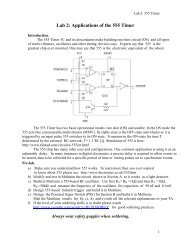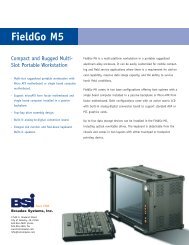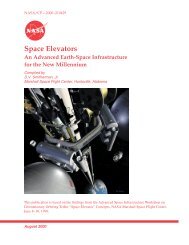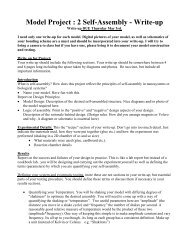- Page 1 and 2:
SAS/ACCESS ® 9.2for Relational Dat
- Page 3 and 4:
ContentsWhat’s New xiiiOverview x
- Page 5 and 6:
vChapter 9 4 SAS/ACCESS Features by
- Page 7 and 8:
viiSQL Pass-Through Facility Specif
- Page 9 and 10:
ixTemporary Table Support for OLE D
- Page 11 and 12:
xiChapter 31 4 Sample Data for SAS/
- Page 13 and 14:
xiiiWhat’s NewOverviewSAS/ACCESS
- Page 15 and 16:
What’s Newxv3 SQLGENERATION= LIBN
- Page 17 and 18:
What’s Newxvii3 BULKLOAD=SAS/ACCE
- Page 19 and 20:
What’s NewxixLIBNAME statement op
- Page 21:
1P A R T1ConceptsChapter 1. .......
- Page 24 and 25:
4 Methods for Accessing Relational
- Page 26 and 27:
6 SAS Views of DBMS Data 4 Chapter
- Page 28 and 29:
8 Examples of Problems That Result
- Page 30 and 31:
10 References 4 Chapter 1%mend;data
- Page 32 and 33:
12 SAS Naming Conventions 4 Chapter
- Page 34 and 35:
14 DBLOAD Procedure 4 Chapter 2The
- Page 36 and 37:
16 Naming Behavior When Creating DB
- Page 38 and 39:
18 Preserving Column Names 4 Chapte
- Page 40 and 41:
20 Using DQUOTE=ANSI 4 Chapter 2If
- Page 42 and 43:
22 Using Name Literals 4 Chapter 2p
- Page 44 and 45:
24 Using a SAS Data Set to Create a
- Page 46 and 47:
26 Triggers 4 Chapter 3You should g
- Page 48 and 49:
28 Protecting Connection Informatio
- Page 50 and 51:
30 Locking, Transactions, and Curre
- Page 52 and 53:
32 Potential Result Set Differences
- Page 55 and 56:
35CHAPTER4Performance Consideration
- Page 57 and 58:
Performance Considerations 4 Sortin
- Page 59:
Performance Considerations 4 Pushin
- Page 62 and 63:
42 Passing Functions to the DBMS Us
- Page 64 and 65:
44 Passing Joins to the DBMS 4 Chap
- Page 66 and 67:
46 Passing DISTINCT and UNION Proce
- Page 68 and 69:
48 Using the DBINDEX=, DBKEY=, and
- Page 70 and 71:
50 Using the DBINDEX=, DBKEY=, and
- Page 72 and 73:
52 SAS/ACCESS Interfaces and Thread
- Page 74 and 75:
54 Generating Trace Information for
- Page 76 and 77:
56 Generating Trace Information for
- Page 78 and 79:
58 Data Ordering in SAS/ACCESS 4 Ch
- Page 81 and 82:
61CHAPTER7How SAS/ACCESS WorksIntro
- Page 83 and 84:
How SAS/ACCESS Works 4 How the SQL
- Page 85 and 86:
How SAS/ACCESS Works 4 How the DBLO
- Page 87 and 88:
67CHAPTER8Overview of In-DatabasePr
- Page 89 and 90:
Overview of In-Database Procedures
- Page 91 and 92:
Overview of In-Database Procedures
- Page 93:
73P A R T2General ReferenceChapter
- Page 96 and 97:
76 SAS/ACCESS Interface to DB2 Unde
- Page 98:
78 SAS/ACCESS Interface to HP Neovi
- Page 101 and 102:
SAS/ACCESS Features by Host 4 SAS/A
- Page 103 and 104:
SAS/ACCESS Features by Host 4 SAS/A
- Page 105:
SAS/ACCESS Features by Host 4 SAS/A
- Page 108 and 109:
88 Using SAS Functions 4 Chapter 10
- Page 110 and 111:
90 LIBNAME Statement Syntax for Rel
- Page 112 and 113:
92 LIBNAME Options for Relational D
- Page 114 and 115:
94 ADJUST_BYTE_SEMANTIC_COLUMN_LENG
- Page 116 and 117:
96 AUTHDOMAIN= LIBNAME Option 4 Cha
- Page 118 and 119:
98 BL_KEEPIDENTITY= LIBNAME Option
- Page 120 and 121:
100 BL_LOG= LIBNAME Option 4 Chapte
- Page 122 and 123:
102 BULKEXTRACT= LIBNAME Option 4 C
- Page 124 and 125:
104 CAST= LIBNAME Option 4 Chapter
- Page 126 and 127:
106 CAST_OVERHEAD_MAXPERCENT= LIBNA
- Page 128 and 129:
108 CONNECTION= LIBNAME Option 4 Ch
- Page 130 and 131:
110 CONNECTION= LIBNAME Option 4 Ch
- Page 132 and 133:
112 CONNECTION= LIBNAME Option 4 Ch
- Page 134 and 135:
114 CONNECTION_GROUP= LIBNAME Optio
- Page 136 and 137:
116 CURSOR_TYPE= LIBNAME Option 4 C
- Page 138 and 139:
118 DB_LENGTH_SEMANTICS_BYTE= LIBNA
- Page 140 and 141:
120 DBCOMMIT= LIBNAME Option 4 Chap
- Page 142 and 143:
122 DBCONTERM= LIBNAME Option 4 Cha
- Page 144 and 145:
124 DBCREATE_TABLE_OPTS= LIBNAME Op
- Page 146 and 147:
126 DBLIBINIT= LIBNAME Option 4 Cha
- Page 148 and 149:
128 DBLIBTERM= LIBNAME Option 4 Cha
- Page 150 and 151:
130 DBMAX_TEXT= LIBNAME Option 4 Ch
- Page 152 and 153:
132 DBMSTEMP= LIBNAME Option 4 Chap
- Page 154 and 155:
134 DBPROMPT= LIBNAME Option 4 Chap
- Page 156 and 157:
136 DBSERVER_MAX_BYTES= LIBNAME Opt
- Page 158 and 159:
138 DBSLICEPARM= LIBNAME Option 4 C
- Page 160 and 161:
140 DEGREE= LIBNAME Option 4 Chapte
- Page 162 and 163:
142 DIRECT_EXE= LIBNAME Option 4 Ch
- Page 164 and 165:
144 DIRECT_SQL= LIBNAME Option 4 Ch
- Page 166 and 167:
146 ERRLIMIT= LIBNAME Option 4 Chap
- Page 168 and 169:
148 FETCH_IDENTITY= LIBNAME Option
- Page 170 and 171:
150 IN= LIBNAME Option 4 Chapter 10
- Page 172 and 173:
152 INSERTBUFF= LIBNAME Option 4 Ch
- Page 174 and 175:
154 KEYSET_SIZE= LIBNAME Option 4 C
- Page 176 and 177:
156 LOCKTIME= LIBNAME Option 4 Chap
- Page 178 and 179:
158 LOGIN_TIMEOUT= LIBNAME Option 4
- Page 180 and 181:
160 MULTI_DATASRC_OPT= LIBNAME Opti
- Page 182 and 183:
162 OR_ENABLE_INTERRUPT= LIBNAME Op
- Page 184 and 185:
164 PACKETSIZE= LIBNAME Option 4 Ch
- Page 186 and 187:
166 PREFETCH= LIBNAME Option 4 Chap
- Page 188 and 189:
168 PRESERVE_TAB_NAMES= LIBNAME Opt
- Page 190 and 191:
170 QUALIFIER= LIBNAME Option 4 Cha
- Page 192 and 193:
172 QUERY_BAND= LIBNAME Option 4 Ch
- Page 194 and 195:
174 QUOTED_IDENTIFIER= LIBNAME Opti
- Page 196 and 197:
176 READ_LOCK_TYPE= LIBNAME Option
- Page 198 and 199:
178 REMOTE_DBTYPE= LIBNAME Option 4
- Page 200 and 201:
180 REREAD_EXPOSURE= LIBNAME Option
- Page 202 and 203:
182 SCHEMA= LIBNAME Option 4 Chapte
- Page 204 and 205:
184 SHOW_SYNONYMS= LIBNAME Option 4
- Page 206 and 207:
186 SQL_FUNCTIONS= LIBNAME Option 4
- Page 208 and 209:
188 SQL_FUNCTIONS= LIBNAME Option 4
- Page 210 and 211:
190 SQL_OJ_ANSI= LIBNAME Option 4 C
- Page 212 and 213:
192 TPT= LIBNAME Option 4 Chapter 1
- Page 214 and 215:
194 TRACE= LIBNAME Option 4 Chapter
- Page 216 and 217:
196 UPDATE_LOCK_TYPE= LIBNAME Optio
- Page 218 and 219:
198 UPDATE_SQL= LIBNAME Option 4 Ch
- Page 220 and 221:
200 UTILCONN_TRANSIENT= LIBNAME Opt
- Page 222 and 223:
202
- Page 224 and 225:
204 Contents 4 Chapter 11BL_DEFAULT
- Page 226 and 227:
206 Contents 4 Chapter 11ML_WORK= D
- Page 228 and 229:
208 AUTHID= Data Set Option 4 Chapt
- Page 230 and 231:
210 BL_ALLOW_READ_ACCESS= Data Set
- Page 232 and 233:
212 BL_BADFILE= Data Set Option 4 C
- Page 234 and 235:
214 BL_CONTROL= Data Set Option 4 C
- Page 236 and 237:
216 BL_COPY_LOCATION= Data Set Opti
- Page 238 and 239:
218 BL_DATAFILE= Data Set Option 4
- Page 240 and 241:
220 BL_DATAFILE= Data Set Option [T
- Page 242 and 243:
222 BL_DB2DATACLAS= Data Set Option
- Page 244 and 245:
224 BL_DB2ERR= Data Set Option 4 Ch
- Page 246 and 247:
226 BL_DB2LDCT2= Data Set Option 4
- Page 248 and 249:
228 BL_DB2MGMTCLAS= Data Set Option
- Page 250 and 251:
230 BL_DB2PRNLOG= Data Set Option 4
- Page 252 and 253:
232 BL_DB2RSTRT= Data Set Option 4
- Page 254 and 255:
234 BL_DB2TBLXST= Data Set Option 4
- Page 256 and 257:
236 BL_DB2UNITCOUNT= Data Set Optio
- Page 258 and 259:
238 BL_DEFAULT_DIR= Data Set Option
- Page 260 and 261:
240 BL_DELETE_ONLY_DATAFILE= Data S
- Page 262 and 263:
242 BL_DELIMITER= Data Set Option 4
- Page 264 and 265:
244 BL_DISCARDFILE= Data Set Option
- Page 266 and 267:
246 BL_DISK_PARALLELISM= Data Set O
- Page 268 and 269:
248 BL_ESCAPE= Data Set Option 4 Ch
- Page 270 and 271:
250 BL_EXECUTE_LOCATION= Data Set O
- Page 272 and 273:
252 BL_EXTERNAL_WEB= Data Set Optio
- Page 274 and 275:
254 BL_FORCE_NOT_NULL= Data Set Opt
- Page 276 and 277:
256 BL_HOST= Data Set Option 4 Chap
- Page 278 and 279:
258 BL_INDEX_OPTIONS= Data Set Opti
- Page 280 and 281:
260 BL_KEEPIDENTITY= Data Set Optio
- Page 282 and 283:
262 BL_LOAD_REPLACE= Data Set Optio
- Page 284 and 285:
264 BL_LOG= Data Set Option 4 Chapt
- Page 286 and 287:
266 BL_NUM_ROW_SEPS= Data Set Optio
- Page 288 and 289:
268 BL_PARFILE= Data Set Option 4 C
- Page 290 and 291:
270 BL_PORT= Data Set Option 4 Chap
- Page 292 and 293:
272 BL_PRESERVE_BLANKS= Data Set Op
- Page 294 and 295:
274 BL_QUOTE= Data Set Option 4 Cha
- Page 296 and 297:
276 BL_REJECT_TYPE= Data Set Option
- Page 298 and 299:
278 BL_RETRIES= Data Set Option 4 C
- Page 300 and 301:
280 BL_SERVER_DATAFILE= Data Set Op
- Page 302 and 303:
282 BL_SUPPRESS_NULLIF= Data Set Op
- Page 304 and 305:
284 BL_SYSTEM= Data Set Option 4 Ch
- Page 306 and 307:
286 BL_TRUNCATE= Data Set Option 4
- Page 308 and 309:
288 BUFFERS= Data Set Option 4 Chap
- Page 310 and 311:
290 BULKLOAD= Data Set Option 4 Cha
- Page 312 and 313:
292 CAST= Data Set Option 4 Chapter
- Page 314 and 315:
294 COMMAND_TIMEOUT= Data Set Optio
- Page 316 and 317:
296 DB_ONE_CONNECT_PER_THREAD= Data
- Page 318 and 319:
298 DBCONDITION= Data Set Option 4
- Page 320 and 321:
300 DBFORCE= Data Set Option 4 Chap
- Page 322 and 323:
302 DBGEN_NAME= Data Set Option 4 C
- Page 324 and 325:
304 DBINDEX= Data Set Option 4 Chap
- Page 326 and 327:
306 DBLABEL= Data Set Option 4 Chap
- Page 328 and 329:
308 DBMASTER= Data Set Option 4 Cha
- Page 330 and 331:
310 DBNULL= Data Set Option 4 Chapt
- Page 332 and 333:
312 DBPROMPT= Data Set Option 4 Cha
- Page 334 and 335:
314 DBSASTYPE= Data Set Option 4 Ch
- Page 336 and 337:
316 DBSLICE= Data Set Option 4 Chap
- Page 338 and 339:
318 DBSLICEPARM= Data Set Option 4
- Page 340 and 341:
320 DBTYPE= Data Set Option 4 Chapt
- Page 342 and 343:
322 DEGREE= Data Set Option 4 Chapt
- Page 344 and 345:
324 DISTRIBUTE_ON= Data Set Option
- Page 346 and 347:
326 ESCAPE_BACKSLASH= Data Set Opti
- Page 348 and 349:
328 IGNORE_ READ_ONLY_COLUMNS= Data
- Page 350 and 351:
330 IN= Data Set Option 4 Chapter 1
- Page 352 and 353:
332 INSERTBUFF= Data Set Option 4 C
- Page 354 and 355:
334 LOCKTABLE= Data Set Option 4 Ch
- Page 356 and 357:
336 ML_CHECKPOINT= Data Set Option
- Page 358 and 359:
338 ML_ERROR2= Data Set Option 4 Ch
- Page 360 and 361: 340 ML_RESTART= Data Set Option 4 C
- Page 362 and 363: 342 MULTILOAD= Data Set Option 4 Ch
- Page 364 and 365: 344 MULTILOAD= Data Set Option 4 Ch
- Page 366 and 367: 346 MULTILOAD= Data Set Option 4 Ch
- Page 368 and 369: 348 MULTISTMT= Data Set Option 4 Ch
- Page 370 and 371: 350 NULLCHAR= Data Set Option 4 Cha
- Page 372 and 373: 352 OR_PARTITION= Data Set Option 4
- Page 374 and 375: 354 OR_PARTITION= Data Set Option 4
- Page 376 and 377: 356 ORHINTS= Data Set Option 4 Chap
- Page 378 and 379: 358 PRESERVE_COL_NAMES= Data Set Op
- Page 380 and 381: 360 QUERY_BAND= Data Set Option 4 C
- Page 382 and 383: 362 READ_LOCK_TYPE= Data Set Option
- Page 384 and 385: 364 READBUFF= Data Set Option 4 Cha
- Page 386 and 387: 366 SASDATEFMT= Data Set Option 4 C
- Page 388 and 389: 368 SEGMENT_NAME= Data Set Option 4
- Page 390 and 391: 370 SET= Data Set Option 4 Chapter
- Page 392 and 393: 372 TENACITY= Data Set Option 4 Cha
- Page 394 and 395: 374 TPT_APPL_PHASE= Data Set Option
- Page 396 and 397: 376 TPT_BUFFER_SIZE= Data Set Optio
- Page 398 and 399: 378 TPT_CHECKPOINT_DATA= Data Set O
- Page 400 and 401: 380 TPT_ERROR_TABLE_1= Data Set Opt
- Page 402 and 403: 382 TPT_LOG_TABLE= Data Set Option
- Page 404 and 405: 384 TPT_MAX_SESSIONS= Data Set Opti
- Page 406 and 407: 386 TPT_PACKMAXIMUM= Data Set Optio
- Page 408 and 409: 388 TPT_RESTART= Data Set Option 4
- Page 412 and 413: 392 TPT_TRACE_OUTPUT= Data Set Opti
- Page 414 and 415: 394 TRAP151= Data Set Option 4 Chap
- Page 416 and 417: 396 UPDATE_ISOLATION_LEVEL= Data Se
- Page 418 and 419: 398 UPDATE_MODE_WAIT= Data Set Opti
- Page 420 and 421: 400 UPDATEBUFF= Data Set Option 4 C
- Page 422 and 423: 402 Macro Variables for Relational
- Page 424 and 425: 404 DBFMTIGNORE= System Option 4 Ch
- Page 426 and 427: 406 DBIDIRECTEXEC= System Option 4
- Page 428 and 429: 408 SASTRACE= System Option 4 Chapt
- Page 430 and 431: 410 SASTRACE= System Option 4 Chapt
- Page 432 and 433: 412 SASTRACE= System Option 4 Chapt
- Page 434 and 435: 414 SASTRACE= System Option 4 Chapt
- Page 436 and 437: 416 SASTRACE= System Option 4 Chapt
- Page 438 and 439: 418 SASTRACE= System Option 4 Chapt
- Page 440 and 441: 420 SQLGENERATION= System Option 4
- Page 442 and 443: 422 SQLMAPPUTTO= System Option 4 Ch
- Page 444 and 445: 424 VALIDVARNAME= System Option 4 C
- Page 446 and 447: 426 Syntax for the SQL Pass-Through
- Page 448 and 449: 428 CONNECT Statement 4 Chapter 13m
- Page 450 and 451: 430 CONNECT Statement 4 Chapter 13D
- Page 452 and 453: 432 EXECUTE Statement 4 Chapter 13A
- Page 454 and 455: 434 CONNECTION TO Component 4 Chapt
- Page 456 and 457: 436 CONNECTION TO Component 4 Chapt
- Page 458 and 459: 438
- Page 460 and 461:
440 LIBNAME Statement Specifics for
- Page 462 and 463:
442 Arguments 4 Chapter 14OptionDBC
- Page 464 and 465:
444 Data Set Options for Aster nClu
- Page 466 and 467:
446 Autopartitioning Scheme for Ast
- Page 468 and 469:
448 Using DBSLICE= 4 Chapter 14Usin
- Page 470 and 471:
450 Bulk Loading for Aster nCluster
- Page 472 and 473:
452 Data Types for Aster nCluster 4
- Page 474 and 475:
454 LIBNAME Statement Data Conversi
- Page 476 and 477:
456 Introduction to SAS/ACCESS Inte
- Page 478 and 479:
458 Arguments 4 Chapter 15REQUIRED=
- Page 480 and 481:
460 Data Set Options for DB2 Under
- Page 482 and 483:
462 SQL Pass-Through Facility Speci
- Page 484 and 485:
464 Autopartitioning Scheme for DB2
- Page 486 and 487:
466 Configuring DB2 EEE Nodes on Ph
- Page 488 and 489:
468 Examples 4 Chapter 15ExamplesIn
- Page 490 and 491:
470 Examples 4 Chapter 15ExamplesTh
- Page 492 and 493:
472 Passing Joins to DB2 Under UNIX
- Page 494 and 495:
474 Capturing Bulk-Load Statistics
- Page 496 and 497:
476 Locking in the DB2 Under UNIX a
- Page 498 and 499:
478 String Data 4 Chapter 15to FOR
- Page 500 and 501:
480 DB2 Null and Default Values 4 C
- Page 502 and 503:
482
- Page 504 and 505:
484 Contents 4 Chapter 16SELECT Sta
- Page 506 and 507:
486 Arguments 4 Chapter 16specifies
- Page 508 and 509:
488 Data Set Options for DB2 Under
- Page 510 and 511:
490 Examples 4 Chapter 16For inform
- Page 512 and 513:
492 How WHERE Clauses Restrict Auto
- Page 514 and 515:
494 Calling Stored Procedures in DB
- Page 516 and 517:
496 ACCESS Procedure Specifics for
- Page 518 and 519:
498 DBLOAD Procedure Specifics for
- Page 520 and 521:
500 The DB2EXT Procedure 4 Chapter
- Page 522 and 523:
502 Examples 4 Chapter 16EXIT State
- Page 524 and 525:
504 DB2UTIL Statements and Options
- Page 526 and 527:
506 PROC DB2UTIL Example 4 Chapter
- Page 528 and 529:
508 Methods for Improving Performan
- Page 530 and 531:
510 Passing SAS Functions to DB2 Un
- Page 532 and 533:
512 SAS System Options, Settings, a
- Page 534 and 535:
514 Settings 4 Chapter 16SettingsTo
- Page 536 and 537:
516 File Allocation and Naming for
- Page 538 and 539:
518 Examples 4 Chapter 16data shlib
- Page 540 and 541:
520 Locking in the DB2 Under z/OS I
- Page 542 and 543:
522 Character Data 4 Chapter 16Char
- Page 544 and 545:
524 LIBNAME Statement Data Conversi
- Page 546 and 547:
526 DBLOAD Procedure Data Conversio
- Page 548 and 549:
528 Non-Libref Connections 4 Chapte
- Page 550 and 551:
530 How and When Connections Are Ma
- Page 552 and 553:
532 Accessing DB2 System Catalogs 4
- Page 554 and 555:
534 Introduction to SAS/ACCESS Inte
- Page 556 and 557:
536 LIBNAME Statement Examples 4 Ch
- Page 558 and 559:
538 Data Set Options for Greenplum
- Page 560 and 561:
540 Autopartitioning Scheme for Gre
- Page 562 and 563:
542 Passing SAS Functions to Greenp
- Page 564 and 565:
544 Passing Joins to Greenplum 4 Ch
- Page 566 and 567:
546 Troubleshooting gpfdist 4 Chapt
- Page 568 and 569:
548 Data Types for Greenplum 4 Chap
- Page 570 and 571:
550 Greenplum Null Values 4 Chapter
- Page 572 and 573:
552
- Page 574 and 575:
554 Introduction to SAS/ACCESS Inte
- Page 576 and 577:
556 Arguments 4 Chapter 18Table 18.
- Page 578 and 579:
558 Data Set Options for HP Neoview
- Page 580 and 581:
560 Special Catalog Queries 4 Chapt
- Page 582 and 583:
562 Temporary Table Support for HP
- Page 584 and 585:
564 Passing SAS Functions to HP Neo
- Page 586 and 587:
566 Loading 4 Chapter 18uses the HP
- Page 588 and 589:
568 Naming Conventions for HP Neovi
- Page 590 and 591:
570 Date, Time, and Timestamp Data
- Page 592 and 593:
572
- Page 594 and 595:
574 Introduction to SAS/ACCESS Inte
- Page 596 and 597:
576 Informix LIBNAME Statement Exam
- Page 598 and 599:
578 Stored Procedures and the SQL P
- Page 600 and 601:
580 Autopartitioning Scheme for Inf
- Page 602 and 603:
582 Terminating a Temporary Table 4
- Page 604 and 605:
584 Locking in the Informix Interfa
- Page 606 and 607:
586 Numeric Data 4 Chapter 19Numeri
- Page 608 and 609:
588 SQL Pass-Through Facility Data
- Page 610 and 611:
590
- Page 612 and 613:
592 LIBNAME Statement Specifics for
- Page 614 and 615:
594 Arguments 4 Chapter 20OptionDBC
- Page 616 and 617:
596 Data Set Options for Microsoft
- Page 618 and 619:
598 Connection To Component Example
- Page 620 and 621:
600 Passing SAS Functions to Micros
- Page 622 and 623:
602 Data Types for Microsoft SQL Se
- Page 624 and 625:
604
- Page 626 and 627:
606 Arguments 4 Chapter 21Here is t
- Page 628 and 629:
608 Data Set Options for MySQL 4 Ch
- Page 630 and 631:
610 Autocommit and Table Types 4 Ch
- Page 632 and 633:
612 Passing SAS Functions to MySQL
- Page 634 and 635:
614 Naming Conventions for MySQL 4
- Page 636 and 637:
616 Numeric Data 4 Chapter 21VARCHA
- Page 638 and 639:
618 LIBNAME Statement Data Conversi
- Page 640 and 641:
620
- Page 642 and 643:
622 Introduction to SAS/ACCESS Inte
- Page 644 and 645:
624 Arguments 4 Chapter 22OptionDBC
- Page 646 and 647:
626 SQL Pass-Through Facility Speci
- Page 648 and 649:
628 Temporary Table Support for Net
- Page 650 and 651:
630 Passing SAS Functions to Netezz
- Page 652 and 653:
632 Bulk Loading and Unloading for
- Page 654 and 655:
634 Deploying and Using SAS Formats
- Page 656 and 657:
636 Deployed Components for In-Data
- Page 658 and 659:
638 Publishing SAS Formats 4 Chapte
- Page 660 and 661:
640 Publishing SAS Formats 4 Chapte
- Page 662 and 663:
642 Publishing SAS Formats 4 Chapte
- Page 664 and 665:
644 Using the SAS_PUT( ) Function i
- Page 666 and 667:
646 Using the SAS_PUT( ) Function i
- Page 668 and 669:
648 Naming Conventions for Netezza
- Page 670 and 671:
650 Netezza Null Values 4 Chapter 2
- Page 672 and 673:
652
- Page 674 and 675:
654 Introduction to SAS/ACCESS Inte
- Page 676 and 677:
656 LIBNAME Statement Specifics for
- Page 678 and 679:
658 Arguments 4 Chapter 23PROMPT=OD
- Page 680 and 681:
660 ODBC LIBNAME Statement Examples
- Page 682 and 683:
662 SQL Pass-Through Facility Speci
- Page 684 and 685:
664 Special Catalog Queries 4 Chapt
- Page 686 and 687:
666 Autopartitioning Scheme for ODB
- Page 688 and 689:
668 Configuring SQL Server Partitio
- Page 690 and 691:
670 DBLOAD Procedure Specifics for
- Page 692 and 693:
672 Examples 4 Chapter 23ExamplesTh
- Page 694 and 695:
674 Passing SAS Functions to ODBC 4
- Page 696 and 697:
676 Bulk Loading for ODBC 4 Chapter
- Page 698 and 699:
678 Data Types for ODBC 4 Chapter 2
- Page 700 and 701:
680 LIBNAME Statement Data Conversi
- Page 702 and 703:
682 LIBNAME Statement Specifics for
- Page 704 and 705:
684 Arguments 4 Chapter 24UDL_FILE=
- Page 706 and 707:
686 Arguments 4 Chapter 24OptionDBM
- Page 708 and 709:
688 OLE DB LIBNAME Statement Exampl
- Page 710 and 711:
690 SQL Pass-Through Facility Speci
- Page 712 and 713:
692 Special Catalog Queries 4 Chapt
- Page 714 and 715:
694 Special Catalog Queries 4 Chapt
- Page 716 and 717:
696 Examples 4 Chapter 24set work.i
- Page 718 and 719:
698 Passing Joins to OLE DB 4 Chapt
- Page 720 and 721:
700 Accessing OLE DB for OLAP Data
- Page 722 and 723:
702 Using the SQL Pass-Through Faci
- Page 724 and 725:
704 Data Types for OLE DB 4 Chapter
- Page 726 and 727:
706 LIBNAME Statement Data Conversi
- Page 728 and 729:
708 Introduction to SAS/ACCESS Inte
- Page 730 and 731:
710 Arguments 4 Chapter 25OptionDBL
- Page 732 and 733:
712 Data Set Options for Oracle 4 C
- Page 734 and 735:
714 Examples 4 Chapter 25ORAPW= is
- Page 736 and 737:
716 Partitioned Oracle Tables 4 Cha
- Page 738 and 739:
718 Performance Summary 4 Chapter 2
- Page 740 and 741:
720 Examples 4 Chapter 253 The PROC
- Page 742 and 743:
722 Examples 4 Chapter 25determine
- Page 744 and 745:
724 Passing SAS Functions to Oracle
- Page 746 and 747:
726 Interactions with Other Options
- Page 748 and 749:
728 Locking in the Oracle Interface
- Page 750 and 751:
730 Numeric Data 4 Chapter 25CLOB (
- Page 752 and 753:
732 Date, Timestamp, and Interval D
- Page 754 and 755:
734 Date, Timestamp, and Interval D
- Page 756 and 757:
736 LIBNAME Statement Data Conversi
- Page 758 and 759:
738 DBLOAD Procedure Data Conversio
- Page 760 and 761:
740 Introduction to SAS/ACCESS Inte
- Page 762 and 763:
742 Sybase LIBNAME Statement Exampl
- Page 764 and 765:
744 SQL Pass-Through Facility Speci
- Page 766 and 767:
746 Overview 4 Chapter 26OverviewSy
- Page 768 and 769:
748 ACCESS Procedure Specifics for
- Page 770 and 771:
750 DBLOAD Procedure Specifics for
- Page 772 and 773:
752 Passing SAS Functions to Sybase
- Page 774 and 775:
754 Locking in the Sybase Interface
- Page 776 and 777:
756 Character Data 4 Chapter 26data
- Page 778 and 779:
758 User-Defined Data 4 Chapter 26U
- Page 780 and 781:
760 ACCESS Procedure Data Conversio
- Page 782 and 783:
762 National Language Support for S
- Page 784 and 785:
764 LIBNAME Statement Specifics for
- Page 786 and 787:
766 Sybase IQ LIBNAME Statement Exa
- Page 788 and 789:
768 SQL Pass-Through Facility Speci
- Page 790 and 791:
770 Autopartitioning Scheme for Syb
- Page 792 and 793:
772 Passing Joins to Sybase IQ 4 Ch
- Page 794 and 795:
774 Locking in the Sybase IQ Interf
- Page 796 and 797:
776 Data Types for Sybase IQ 4 Chap
- Page 798 and 799:
778 Sybase IQ Null Values 4 Chapter
- Page 800 and 801:
780
- Page 802 and 803:
782 Contents 4 Chapter 28Using Fast
- Page 804 and 805:
784 LIBNAME Statement Specifics for
- Page 806 and 807:
786 Arguments 4 Chapter 28DATABASE=
- Page 808 and 809:
788 Data Set Options for Teradata 4
- Page 810 and 811:
790 SQL Pass-Through Facility Speci
- Page 812 and 813:
792 Autopartitioning Scheme for Ter
- Page 814 and 815:
794 Using FastExport 4 Chapter 28As
- Page 816 and 817:
796 Temporary Table Support for Ter
- Page 818 and 819:
798 Passing SAS Functions to Terada
- Page 820 and 821:
800 Passing Joins to Teradata 4 Cha
- Page 822 and 823:
802 Using the PreFetch Facility 4 C
- Page 824 and 825:
804 Maximizing Teradata Load Perfor
- Page 826 and 827:
806 Using MultiLoad 4 Chapter 283 u
- Page 828 and 829:
808 Using the TPT API 4 Chapter 28T
- Page 830 and 831:
810 Using the TPT API 4 Chapter 28S
- Page 832 and 833:
812 Teradata Processing Tips for SA
- Page 834 and 835:
814 Using TIME and TIMESTAMP 4 Chap
- Page 836 and 837:
816 Reducing Workload on Teradata b
- Page 838 and 839:
818 How It Works 4 Chapter 28Figure
- Page 840 and 841:
820 Data Types and the SAS_PUT( ) F
- Page 842 and 843:
822 Publishing SAS Formats 4 Chapte
- Page 844 and 845:
824 Publishing SAS Formats 4 Chapte
- Page 846 and 847:
826 Publishing SAS Formats 4 Chapte
- Page 848 and 849:
828 Using the SAS_PUT( ) Function i
- Page 850 and 851:
830 Determining Format Publish Date
- Page 852 and 853:
832 Locking in the Teradata Interfa
- Page 854 and 855:
834 Understanding SAS/ACCESS Lockin
- Page 856 and 857:
836 Examples 4 Chapter 28Here is wh
- Page 858 and 859:
838 Data Types for Teradata 4 Chapt
- Page 860 and 861:
840 Numeric Data 4 Chapter 28Numeri
- Page 862 and 863:
842 Data Returned as SAS Binary Dat
- Page 864 and 865:
844
- Page 866 and 867:
846
- Page 868 and 869:
848 Creating SAS Data Sets from DBM
- Page 870 and 871:
850 Reading Data from Multiple DBMS
- Page 872 and 873:
852 Querying a DBMS Table 4 Chapter
- Page 874 and 875:
854 Querying Multiple DBMS Tables 4
- Page 876 and 877:
856 Updating DBMS Data 4 Chapter 29
- Page 878 and 879:
858 Creating a DBMS Table 4 Chapter
- Page 880 and 881:
860 Using the DATASETS Procedure 4
- Page 882 and 883:
862 Using the RANK Procedure 4 Chap
- Page 884 and 885:
864 Using the APPEND Procedure 4 Ch
- Page 886 and 887:
866 Joining DBMS and SAS Data 4 Cha
- Page 888 and 889:
868 Retrieving DBMS Data with a Pas
- Page 890 and 891:
870 Combining an SQL View with a SA
- Page 892 and 893:
872 Using a Pass-Through Query in a
- Page 894 and 895:
874
- Page 896 and 897:
876 Descriptions of the Sample Data
- Page 898 and 899:
878 Descriptions of the Sample Data
- Page 900 and 901:
880
- Page 902 and 903:
882 Syntax: PROC CV2VIEW 4 Chapter
- Page 904 and 905:
884 SAVEAS= Statement 4 Chapter 32F
- Page 906 and 907:
886 TYPE= Statement 4 Chapter 32TYP
- Page 908 and 909:
888 Example 2: Converting a Library
- Page 910 and 911:
890
- Page 912 and 913:
892
- Page 914 and 915:
894 About ACCESS Procedure Statemen
- Page 916 and 917:
896 PROC ACCESS Statement 4 Appendi
- Page 918 and 919:
898 CREATE Statement 4 Appendix 1li
- Page 920 and 921:
900 LIST Statement 4 Appendix 1Deta
- Page 922 and 923:
902 RESET Statement 4 Appendix 1If
- Page 924 and 925:
904 SUBSET Statement 4 Appendix 1co
- Page 926 and 927:
906 UPDATE Statement 4 Appendix 1De
- Page 928 and 929:
908 View Descriptors 4 Appendix 1Fi
- Page 930 and 931:
910 Example 2: Create a View Descri
- Page 932 and 933:
912 Properties of the DBLOAD Proced
- Page 934 and 935:
914 PROC DBLOAD Statement 4 Appendi
- Page 936 and 937:
916 DELETE Statement 4 Appendix 2Us
- Page 938 and 939:
918 LOAD Statement 4 Appendix 2Deta
- Page 940 and 941:
920 QUIT Statement 4 Appendix 2QUIT
- Page 942 and 943:
922 TABLE= Statement 4 Appendix 2De
- Page 944 and 945:
924 Example: Append a Data Set to a
- Page 946 and 947:
926
- Page 948 and 949:
928 GlossaryDATA step viewa type of
- Page 950 and 951:
930 Glossaryreferential integritya
- Page 952 and 953:
932
- Page 954 and 955:
934 Indexattachment facility 513, 5
- Page 956 and 957:
936 Indexbulk unloading 103Netezza
- Page 958 and 959:
938 IndexSybase IQ 778Teradata 104,
- Page 960 and 961:
940 Indexsupported features 77syste
- Page 962 and 963:
942 IndexDIRECT_EXE= LIBNAME option
- Page 964 and 965:
944 Indexpassing joins to 544passin
- Page 966 and 967:
946 Indexlast inserted identity val
- Page 968 and 969:
948 Indexrestarting 343retries for
- Page 970 and 971:
950 Indexdata conversions, DBLOAD p
- Page 972 and 973:
952 IndexRrandom access engineSAS/A
- Page 974 and 975:
954 Indexpublishing SAS formats 821
- Page 976 and 977:
956 Indexsubqueries 871SUBSET state
- Page 978 and 979:
958 Indexscope of 52summary of 59Sy
- Page 980 and 981:
960 IndexWeb serverfile location fo


